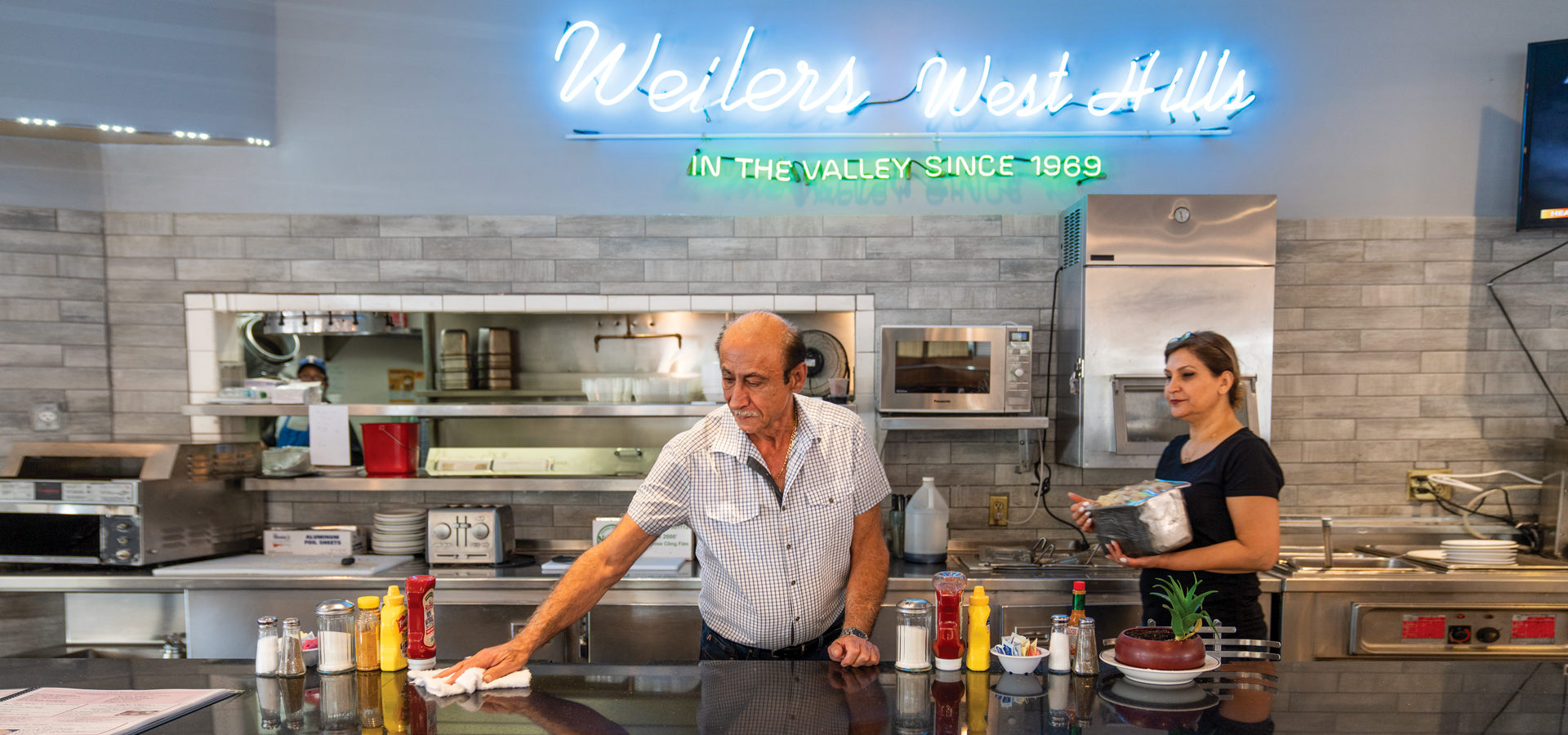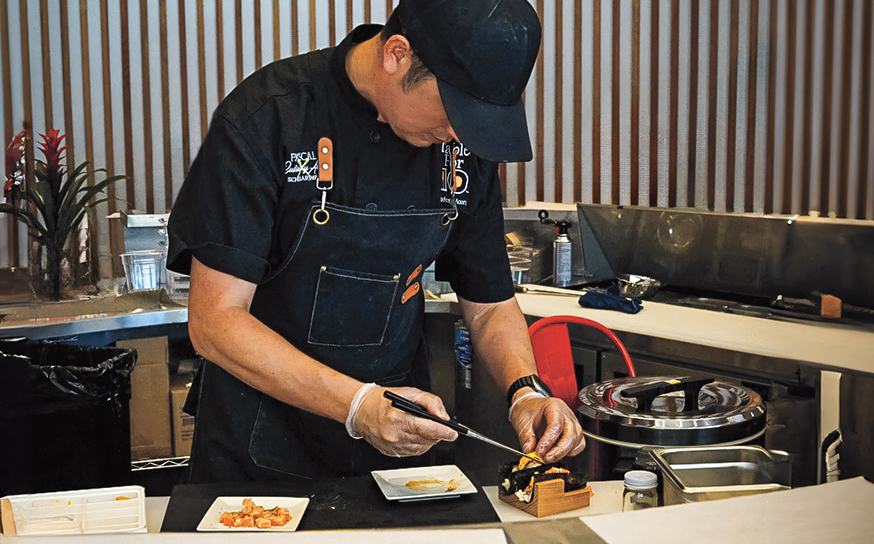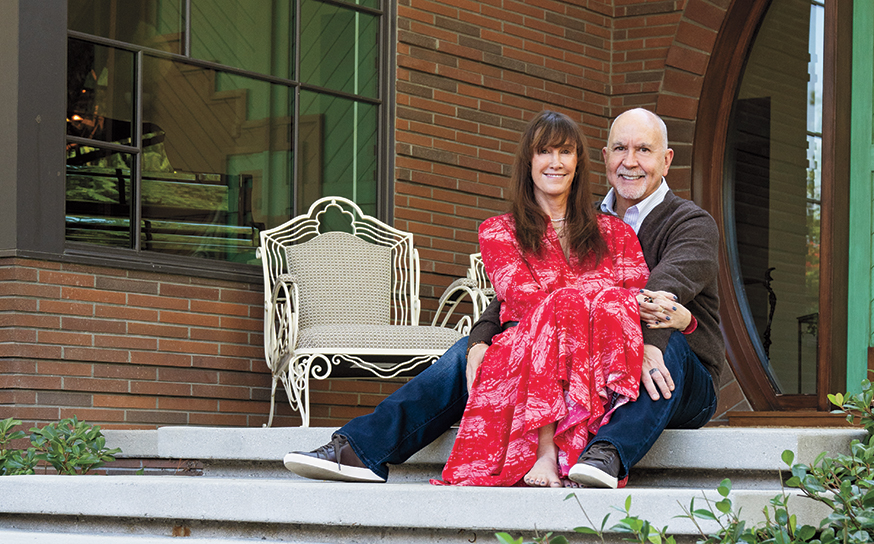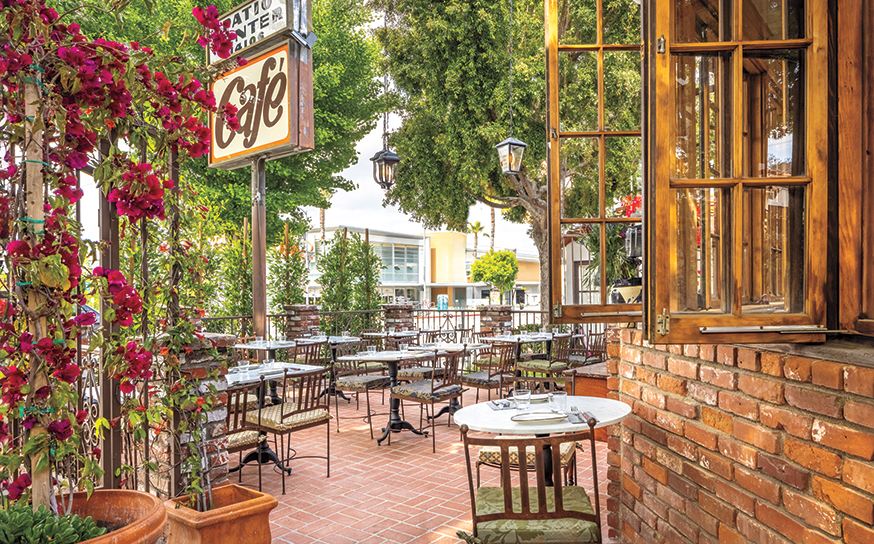Whatever Happened to the Jerry’s Famous Deli Franchise?
And the challenges other Valley delis are facing.
-
CategoryEat & Drink, People
-
Written byJoshua Lurie
-
Photographed byShane O’Donnell
During the ’90s and up until about 2010, you couldn’t walk into a Jerry’s Famous Deli in the Valley at breakfast or lunchtime without seeing a line: people queueing up to grab a table or pick up takeout. The delicatessen’s success was about more than just comfort food. Sure, they served mile-high Reuben sandwiches and chicken breast-packed matzo ball soup—but there was also a vibe. Jerry’s just buzzed. If it wasn’t a celebrity sighting, you could spot the “it” studio executive of the moment sitting in the booth next to you—if you were dining at the Studio City location near CBS Studio Center and Warner Bros.
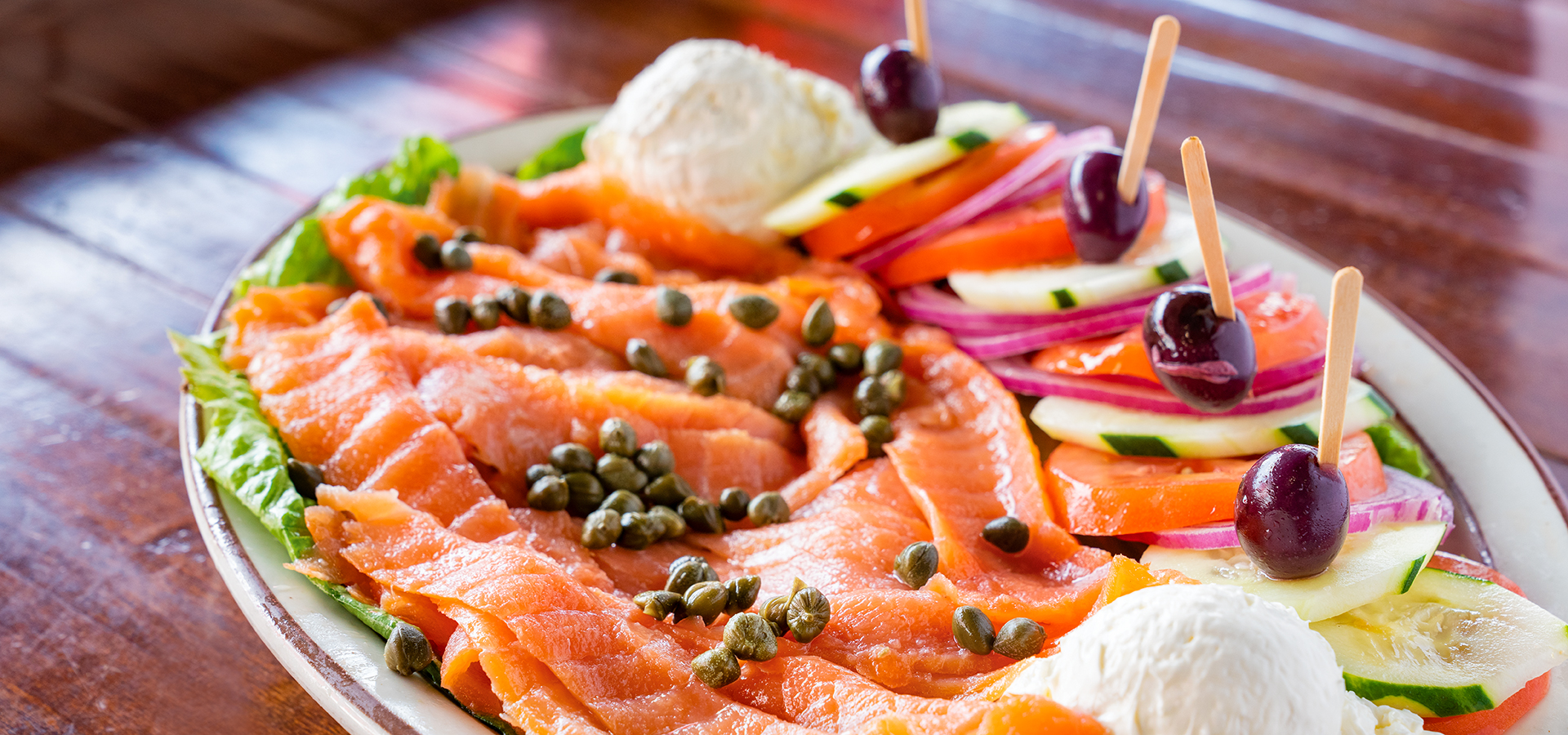
Above: Smoked salmon platter at Uncle Bernie’s
•••
In recent years, Jerry’s success started waning. The first deli to go: the location near Cedar-Sinai Medical Center, in 2013. Three years later the Woodland Hills spot shut down. Then in the middle of the pandemic, their two other Valley hubs, Encino and Studio City, went dark.
The Valley has endured other losses. Solley’s on Van Nuys Boulevard departed Sherman Oaks in 2015. 2019 brought two more closures: Weiler’s in Northridge, which shut down after 57 years in business, and Marv’s Deli in Valley Village. Still, Jerry’s Famous Deli may have been the biggest surprise.
Starting in 1978, Jerry Seidman and Isaac “Ike” Starkman grew a humble bagel delivery business into a bustling chain, beginning with the Studio City location. Over the years that outlet became a Boulevard mainstay.
Isaac’s son Guy Starkman took over the reins as CEO after his father passed away from a heart attack in 2008 at age 70.
Jonathan Mitchell, CEO of Mitchell Hospitality Investments, LLC, started acquiring shares of the deli in 2000, ultimately taking complete ownership. He was running the chain with his daughter Mandy until it shut down. He cited several factors as to what went wrong. In his opinion, it was “government-imposed wage and workers’ compensation regulations, building department and other regulatory agency delays and demands, unbearable fees and taxes, and poor handling of the pandemic by state and local officials.” Even pre-pandemic, he wasn’t satisfied with business, saying, “The risks of operating the restaurant were simply too high for the anemic return.”
Jonathan says he’s open to a possible return to their old Studio City address if and when the landlord redevelops the property. “We would love to revive Jerry’s, but the likelihood of our doing so in California is slim,” he says. “We’re hoping to reorganize and operate in other areas.”
Nevertheless, Jonathan is still bullish on delis. “There’s a definite need for Jewish delis in LA,” he says. “While they may not be as fashionable in the way they ran in the mid- and even late 20th century” they can be very relevant today if they adapt to today’s customer wants. Healthier menu choices and reformulations of historical deli fare to suit current trends will definitely contribute to sustaining the deli business. Of course, a few traditional items must always be available.”
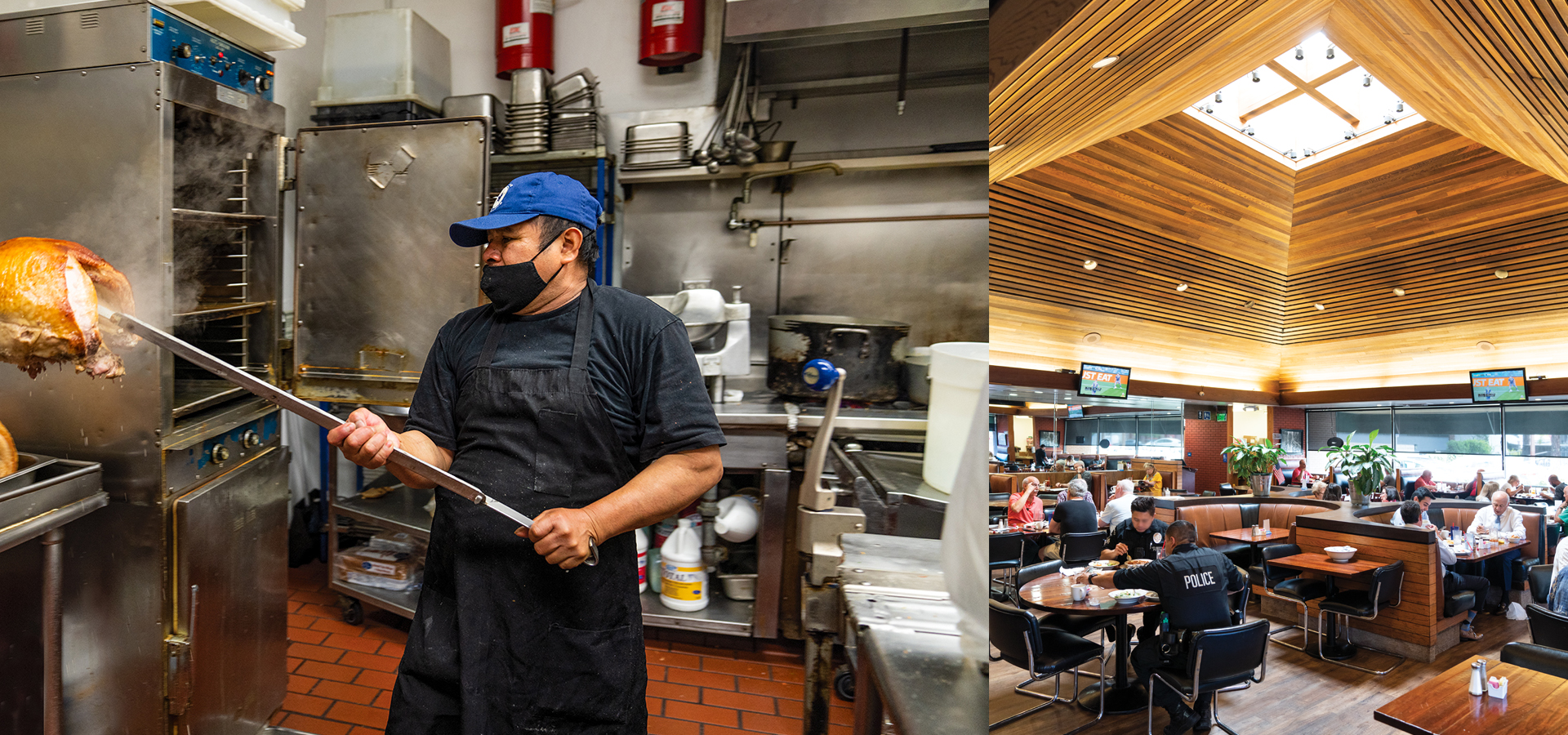
Above: A cook takes a turkey out of the oven | The scene at Uncle Bernie’s
•••
Still Here: Mort’s
Deli news isn’t all dire. Art’s Deli, Brent’s Deli, Famous Label’s Delicatessen and Uncle Bernie’s Deli all survived the pandemic and continue to offer menus that don’t just appeal to the area’s large Jewish community, but to the community as a whole.
In Tarzana, Mort Medway founded Mort’s Deli in 1968. Lana Pavlick, who started as an employee there 37 years ago, became the owner in 2012, carrying on enduring traditions next to Bea’s Bakery. Iconic posters line Mort’s walls, including The New Yorker cover depicting Manhattan as the center of the universe. People still enjoy Reubens and matzo brei in green cushioned booths.
Lana describes business before COVID-19 as “very good.” During the pandemic, she managed to retain most of her staff, defying the odds. “It really didn’t pay the bills, but I stayed open the whole time,” Lana says.
Like most delis, Mort’s must contend with skyrocketing meat prices—particularly tough for a restaurant that relies on prodigious proteins like pastrami and corned beef. Lana recently had to raise prices and eliminate lunch and dinner specials, which, so far, customers have handled well. “I’m trying to play catch-up here,” she says. Lana remains hopeful about delis, but acknowledges, “There seem to be fewer and fewer of them.”
•••
Still Here: Lovi’s
At Lovi’s Deli in Calabasas, a white dining tent popped up in a spacious parking lot in response to COVID-19, enabling the deli to keep a healthy customer flow and steady business. Inside, past a flower-filled patio, cases offer options like knishes, cinnamon rolls and pies. Lovi Lounge sports bar is to the right, a dining room on the left.
David Lovi and his cousin started with a food market in Mid-City before opening Country Deli in Chatsworth in 1979. The late duo added Agoura’s Famous Deli in Agoura Hills in 1995. David’s son Alex now runs both delis with his older sister, Nurit. Lovi’s in Calabasas is the family’s latest restaurant, which Alex debuted in 2014. He was originally going to call it Calabasas Deli, but a manager suggested using the family name. “I’m glad I put Lovi’s in honor of my father,” Alex says. “Not even the Nazis killed our name. Everyone on the 101 sees it, the legacy of my father’s survival in a concentration camp.”
Alex’s father suffered horrific losses in Auschwitz during World War II, including both parents and several siblings. David returned to Romania and later started a family. He received permission from the Communist Party to have Alex’s bar mitzvah in Israel, where many family members had already emigrated. Instead of returning to Romania, they left everything behind to join Nurit in LA in 1970.
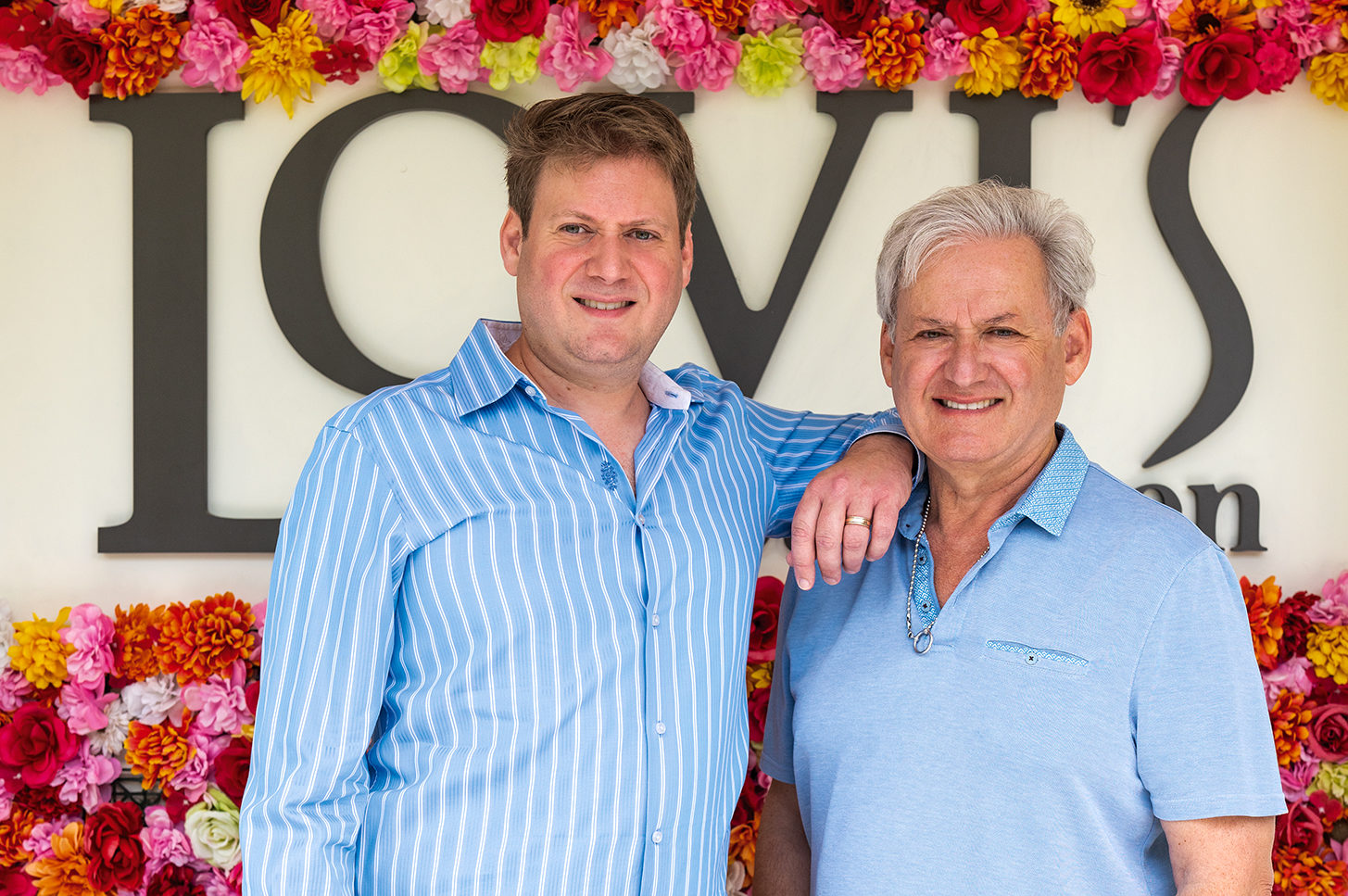
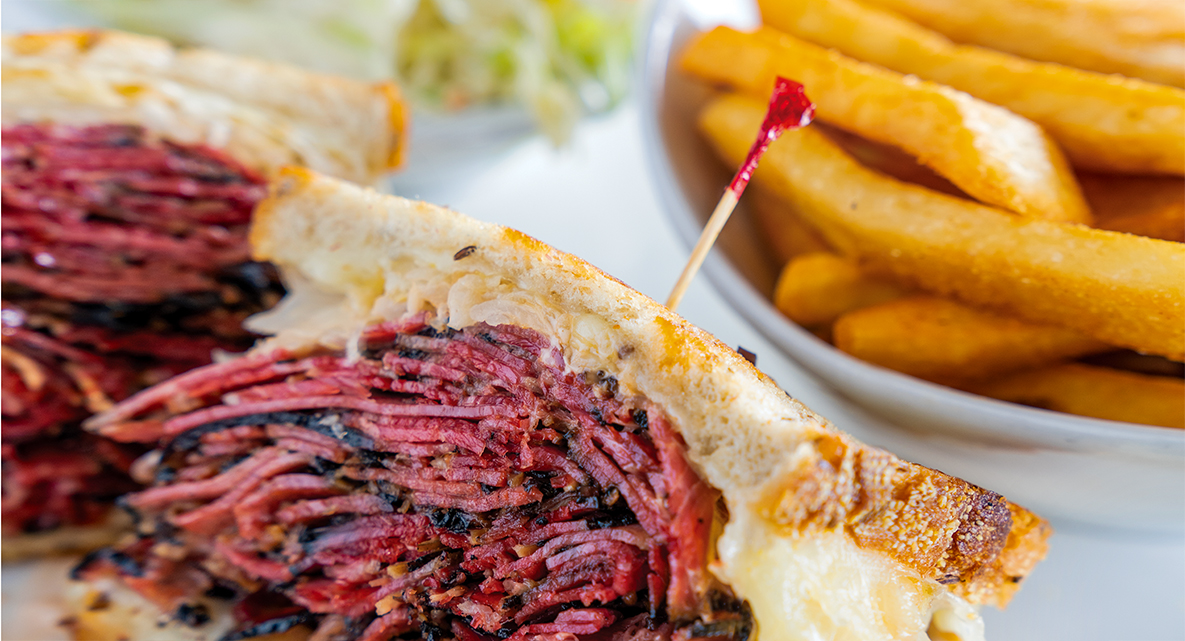
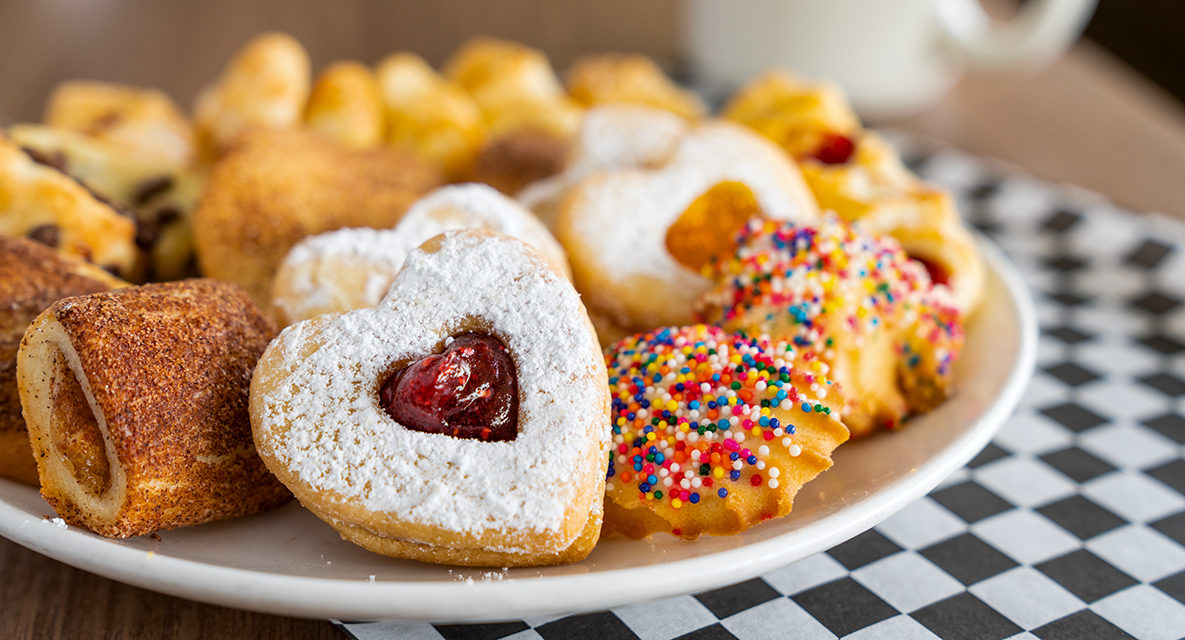
Above: The father-son team of Brian and Alex Lovi | The “Zoltan” Reuben sandwich at Lovi’s Deli | A platter of cookies at Lovi’s
•••
“He always had a love for food because there was never food to eat in concentration camps,” Alex says. “He became a food connoisseur, especially of Jewish food, because that’s what they learned to do.”
Alex originally worked as a lawyer for a Century City firm. After his father suffered a massive heart attack, he took leave to drive his dad to work at Country Deli. He ended up enjoying the deli business more than law, so he stayed. Alex partnered with his cousin, also named David Lovi, after his father passed away.
At Lovi’s Deli, Alex focuses on Eastern European Jewish dishes like Romanian skirt steak, chicken noodle soup made with his mother’s recipe, and the Zoltan, a Reuben variation his father inspired that combines New York black pastrami and corned beef. The Lovis also offer salads for lighter eaters, including a popular Chinese chicken salad they’ve served for over 40 years.
Son Brian is now general manager for all three delis after completing his own stint as a Century City lawyer. When Alex’s cousin died, he carried a heavy load. “I could see the stress taking a toll on him,” Brian says. He offered to help out his father and never left. He quotes The Godfather, joking, “Just when I thought I was out, they pull me back in!”
In many cases, restaurants close because there isn’t a next generation to jump in, or that generation chooses different careers. Lovi’s Deli has a succession plan in place. “The only reason I feel this restaurant will survive is because of Brian and my sister, Nurit,” Alex says. “They love the business. God forbid something happens to me, they’ll be able to continue.” Daughter Jessica is also involved.
Alex describes himself as “semiretired,” yet he works six days a week. “It’s a very demanding business,” he says. “If you didn’t love it, you won’t be in the deli business, or in any restaurant business. If you’re not hands-on, usually any business will fail. Especially a deli where people love to say hi to you. It’s like Cheers. They want to come in, see how you’re doing, and schmooze with you. It’s all about family and relationships.”
Before the pandemic, Lovi family delis were all successful. COVID-19 posed unprecedented challenges, but they’ve all survived. “No restaurant and no deli survives unless you have support from the community,” Alex says. “We’ve been blessed to have wonderful support.”
Alex cites last November, when California completely shut down on-site dining for about two months, as a particularly brutal stretch. “It was an awful experience that I will never forget,” he says. “I decided to keep everybody fully paid even though I was losing huge amounts of money. That’s why today, while most people can’t find cooks, servers, or whatever, we’re pretty well staffed. I also allowed all my staff to take free food home to feed their families.”
Brian stresses the importance of staying current. “What sold in the ’80s at old-school delis doesn’t sell anymore,” he says. “You’ve got to evolve.” They point to dishes like the Jessica Salad, made with grilled sesame-marinated chicken breast, avocado, dried cranberries, tortilla strips, Gorgonzola cheese and baby greens.
Another strategy at Lovi’s: differentiation. During the pandemic, Lovi’s also launched José Goldstein’s Mexican Grill, a takeout and delivery concept that centers on tacos, burritos and breakfast items. The duo bet on José Goldstein’s to supplement revenue while drawing on their kitchen’s strong Mexican American contingent. Chef Fernando Lanuza and other longtime employees have worked with Alex for more than 20 years. Alex jokes, “Once you check in, you don’t check out.”
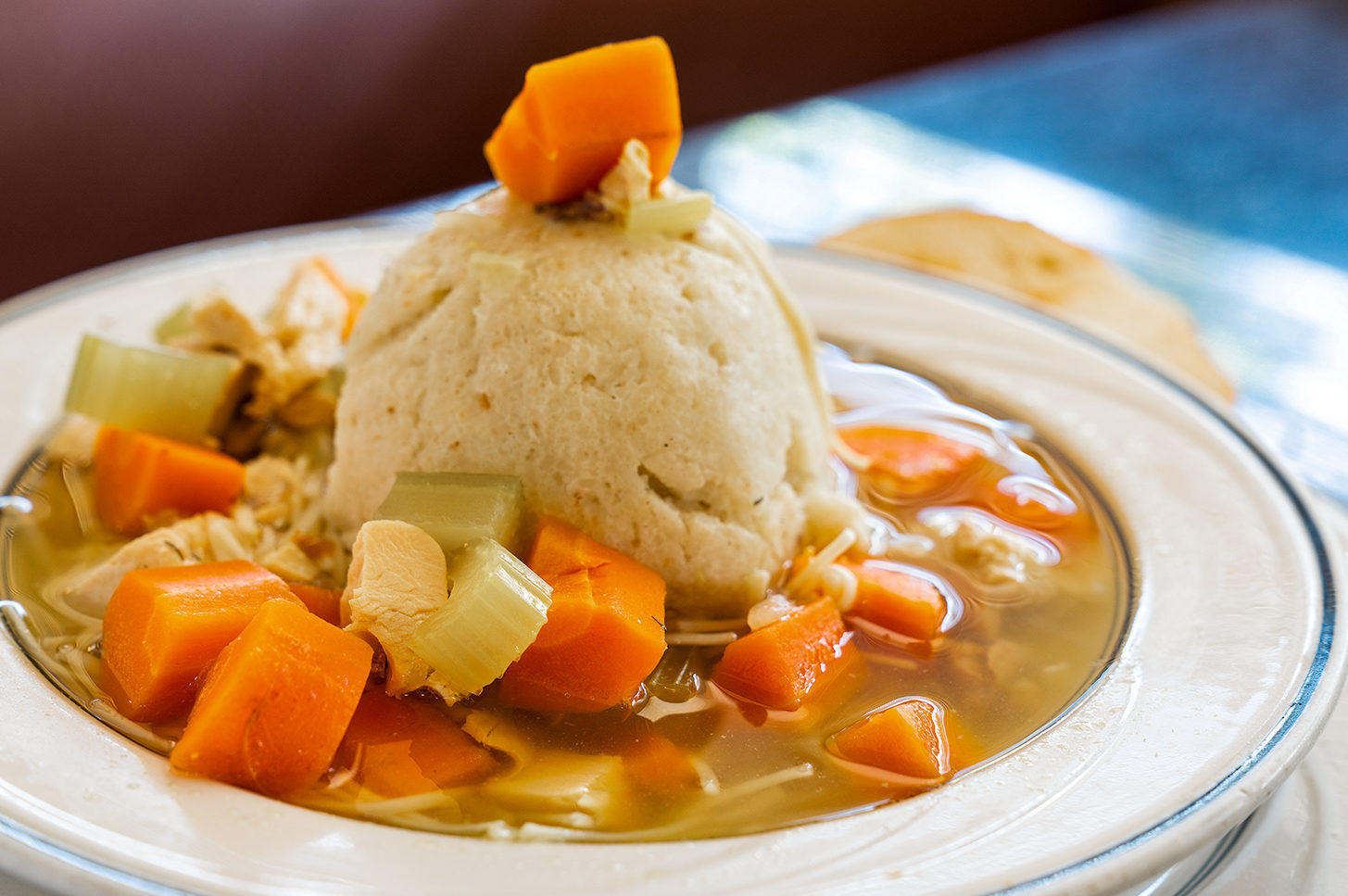
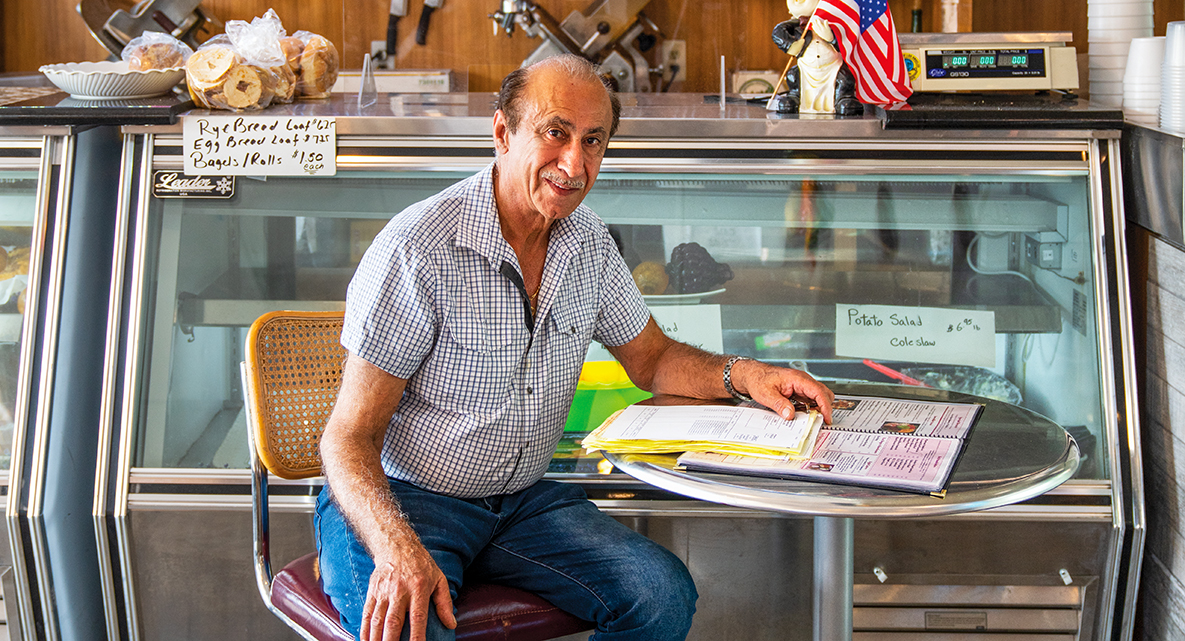
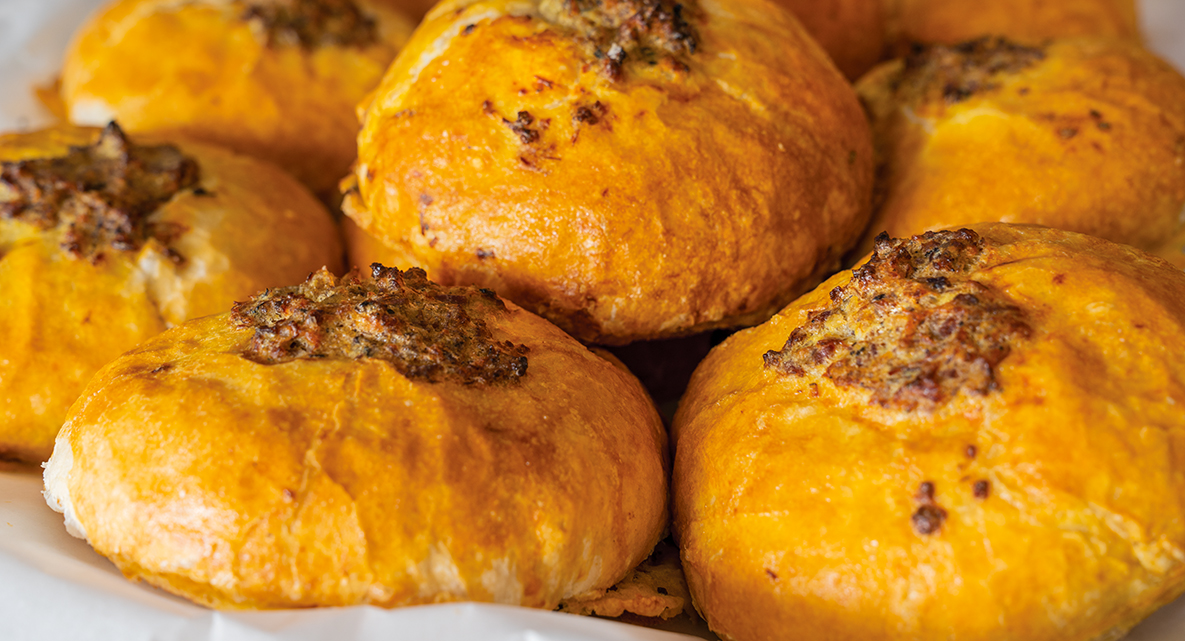
Above: Weiler’s matzo ball soup | Simon Mesriani at Weiler’s West Hills Deli | A platter of meat knish
•••
Still Here: Weiler’s
The Mesriani brothers have also made a big impact on the Valley’s Jewish deli landscape. In 1979, Simon Mesriani and brother Frank were in England studying metallurgy and mechanical engineering, respectively. The brothers only worked in those fields for one year. After Ayatollah Khomeini took control in Iran, the Mesrianis moved to LA rather than return home to face possible persecution as Iranian Jews. They first ran an Italian deli in Hollywood and later bought Frank Weiler’s Deli in 1983 from founder Larry Weiler, keeping the name. After the 1994 Northridge earthquake, they replaced a damaged Italian restaurant with Weiler’s West Hills Deli on Sherman Way. Now Simon runs Weiler’s West Hills Deli and Frank runs the original restaurant.
Both delis spotlight Jewish classics like cabbage soup, pastrami melts, and herring marinated with sour cream and onions, though they do serve many non-Jewish items.
According to Simon, Weiler’s West Hills Deli was performing well before the pandemic. Business dipped 50 to 60% at one point, but it’s now rebounding. “After this pandemic is over, probably business will be as usual because we have salads and burgers—a variety of foods—so it’s popular with every kind of crowd,” Simon says.
“The biggest challenge is fast-food places,” Simon says. “Also, people eat healthier these days. If you want pastrami or corned beef, and don’t want to eat healthy, then you go for pastrami or corned beef. The trend of eating between young people and old people is changing, because the younger ones go for tacos and sushi.”
One of the biggest challenges is the lack of young diners. “We depend on older customers, but if they pass away, it’s hard to replace those loyal customers,” he says. Still, he’s optimistic about his deli and Jewish delis in general, saying, “That’s why I’m still here.”
•••
Newcomers
There is evidence that indicates that the Jewish deli genre is still alive and well. Other parts of LA have seen some noteworthy Jewish deli openings in recent years. There’s Daughter’s Deli from Trisha Langer in West Hollywood, Freedman’s from Jonah Freedman in Echo Park (currently on hiatus) and Wexler’s Deli, with locations in Santa Monica and Grand Central Market.
Brian Lovi isn’t really surprised. In light of the closures over the past decade, the Lovis believe Jewish delis aren’t particularly unique, and that the key to continued success is pretty basic. “I don’t think a Jewish delicatessen faces anything more to stay relevant than another restaurant does,” Brian says. “You’ve just got to provide good food, good service, beautiful ambience, and if you are your best, the results come naturally.”
Join the Valley Community






